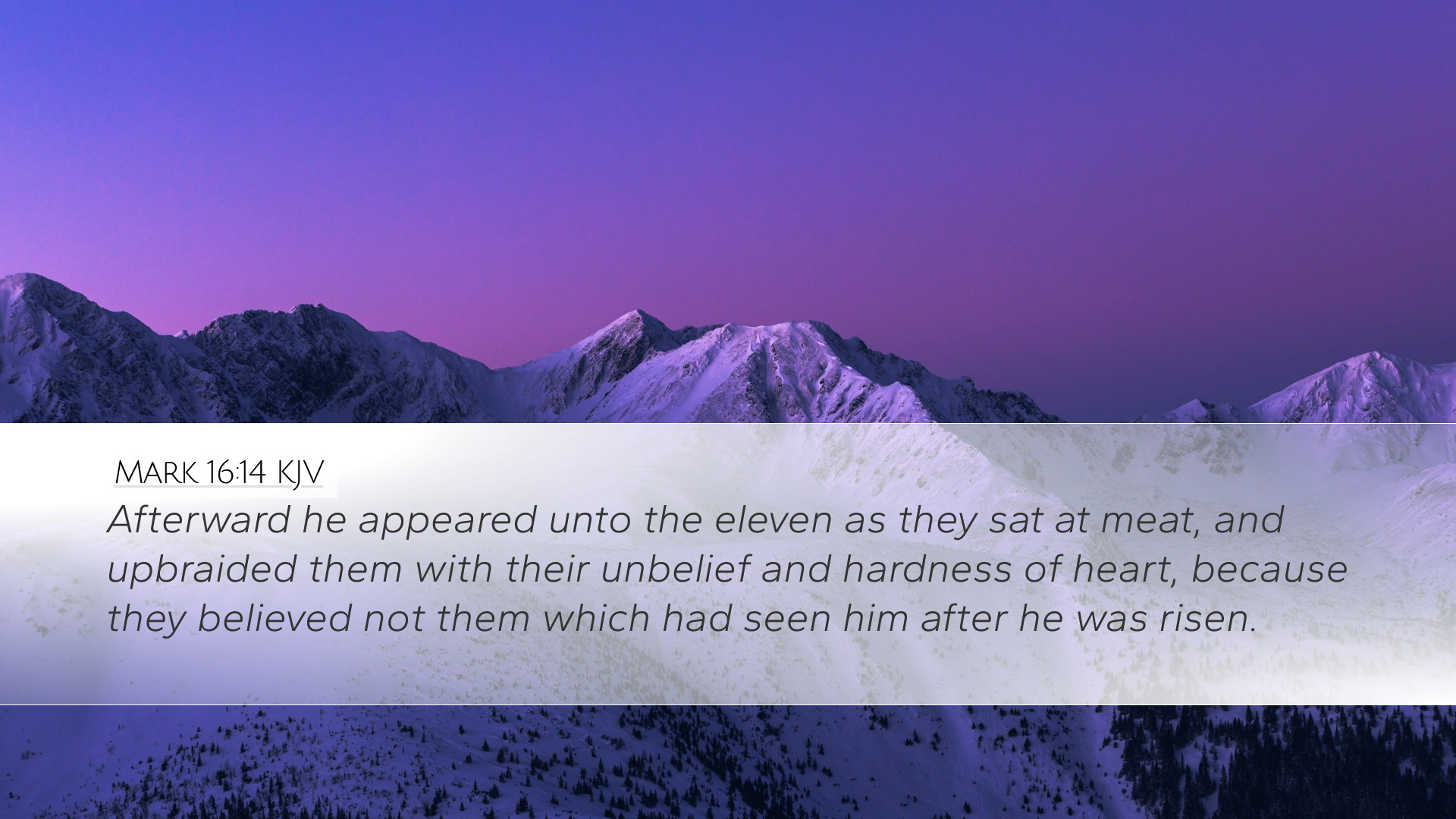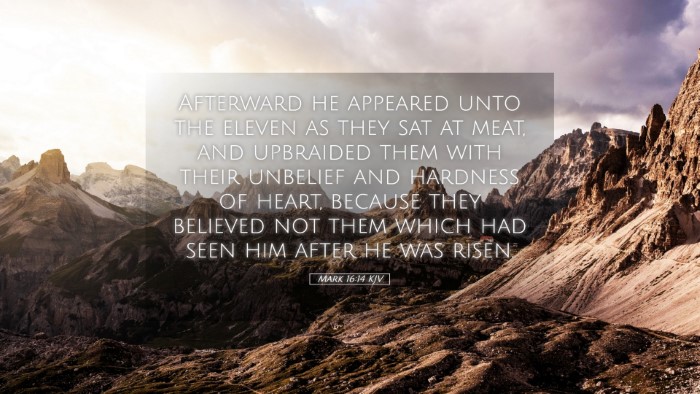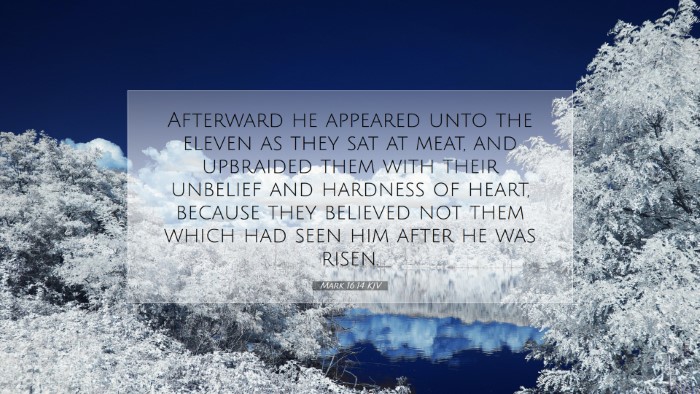Old Testament
Genesis Exodus Leviticus Numbers Deuteronomy Joshua Judges Ruth 1 Samuel 2 Samuel 1 Kings 2 Kings 1 Chronicles 2 Chronicles Ezra Nehemiah Esther Job Psalms Proverbs Ecclesiastes Song of Solomon Isaiah Jeremiah Lamentations Ezekiel Daniel Hosea Joel Amos Obadiah Jonah Micah Nahum Habakkuk Zephaniah Haggai Zechariah MalachiMark 16:14
Mark 16:14 KJV
Afterward he appeared unto the eleven as they sat at meat, and upbraided them with their unbelief and hardness of heart, because they believed not them which had seen him after he was risen.
Mark 16:14 Bible Commentary
Commentary on Mark 16:14
Verse: Mark 16:14 - "Afterward, he appeared unto the eleven as they sat at meat, and upbraided them with their unbelief and hardness of heart, because they believed not them which had seen him after he was risen."
Introduction
This verse, occurring in the conclusion of Mark's Gospel, serves as a pivotal moment of revelation and correction. It depicts the risen Christ confronting his disciples, emphasizing themes of belief, criticism, and the mission ahead. The significance of this encounter cannot be overstated, as it encapsulates both the response of the apostles to the resurrection and Jesus' charge to them moving forward.
Contextual Analysis
To fully appreciate the gravity of Mark 16:14, one must consider the surrounding narrative. Earlier in the chapter, the discovery of the empty tomb and the announcements by the angels are met with a profound reaction of fear by the women who witness the resurrection. Jesus' eventual appearance to Mary Magdalene, who tells the disciples about His resurrection, sets the stage for this critical moment described in verse 14. The disbelief from the apostles emphasizes their initial failure to grasp the fullness of Jesus' teachings regarding his death and resurrection.
Interpretation of "He appeared"
The phrase "he appeared unto the eleven" holds significant weight. Jesus' appearance is a testament to His physical resurrection. It underscores the reality that Jesus, now glorified, is indeed alive and engaged with His followers. This appearance is not merely for reassurance but serves as both a confirmation of their faith and a challenge to their doubts.
Jesus' Rebuke
- Unbelief: Jesus upbraids them for their "unbelief." This suggests a deep-seated skepticism that persisted despite the testimonies of others who had encountered the risen Lord. Both Matthew Henry and Albert Barnes note that this was not just an emotional response but indicated a failure to comprehend the prophecies and teachings of Christ throughout His ministry.
- Hardness of Heart: The term "hardness of heart" illustrates a spiritual dullness that hindered their perception of spiritual truths. Adam Clarke emphasizes that this hardness stemmed from an unwillingness to accept the miraculous, reflecting the broader human condition of doubt and skepticism in the face of divine revelation.
The Significance of Belief
Jesus' rebuke serves not only as a correction, but also as a reminder of the importance of faith. The disciples' initial rejection of the resurrection accounts highlights a universal struggle in understanding and accepting divine truths. The theological implications are profound; belief is essential for receiving God's promises. As noted by Matthew Henry, this moment teaches that the grace of God can confront even the most entrenched doubts.
Responses to the Resurrection
The varied responses to the resurrection among the disciples reveal much about human nature. Different personalities react differently to spiritual truths, showcasing the need for patience and pastoral care. Furthermore, the parallel to contemporary believers’ responses indicates that doubt is still a challenge in the faith community today.
Theological Implications
- Revelation of Christ: This appearance reinforces the doctrine of the resurrection and Christ's lordship. His power over death is fundamental to Christian faith.
- Mission of the Church: Jesus’ subsequent commissioning to the disciples underscores the missional aspect of the church. This reinforces that belief is not an end in itself but a catalyst for evangelism.
Conclusion
Mark 16:14 serves as a powerful reminder of the complexities of faith. The direct confrontation by Jesus imparts critical lessons on belief, the human condition, and the ongoing mission of the church. For pastors, students, theologians, and scholars, this passage invites deeper reflection on the nature of faith, the significance of the resurrection, and how to engage the doubts of both ourselves and our communities. It compels believers to confront their own unbelief and to affirm the risen Christ's presence in their lives and ministries.


